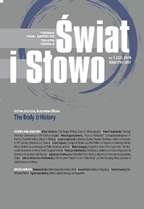The power of paradox: notes on categories of the tragic, mono no
aware, and lacrimae rerum
The power of paradox: notes on categories of the tragic, mono no
aware, and lacrimae rerum
Author(s): Maria KorusiewiczSubject(s): Philosophy, Language and Literature Studies, Fine Arts / Performing Arts, Non-European Philosophy, Ethics / Practical Philosophy, Aesthetics, East Asian Philosophy
Published by: Akademia Techniczno-Humanistyczna w Bielsku-Białej
Keywords: the tragic;mono no aware;lacrimae rerum;paradox;finitude;
Summary/Abstract: The paper is an attempt to investigate the intriguing convergence of the inner logic of three aesthetic categories that emerge from the experience of finitude of existence in diverse cultural environments: the awareness of the tragic in Western cultures, the Japanese category of mono no aware, expressing the painful beauty of things in their impermanence, and a famous Greco-Roman notion of lacrimae rerum (tears of things). All three – despite the deep disparities between the cultural traditions they represent – prove to be the “places” of paradox, of powerful synchronic tension resulting from the “clash” of contradictory forces, transforming one’s perception of the universum. It seems that it is the paradoxical nature of the experiences labelled by these categories (as confirmed by neuroscience) that allows us to confront our finitude with the aid of aesthetic tools.
Journal: Świat i słowo
- Issue Year: 1/2020
- Issue No: 34
- Page Range: 233-250
- Page Count: 18
- Language: English

